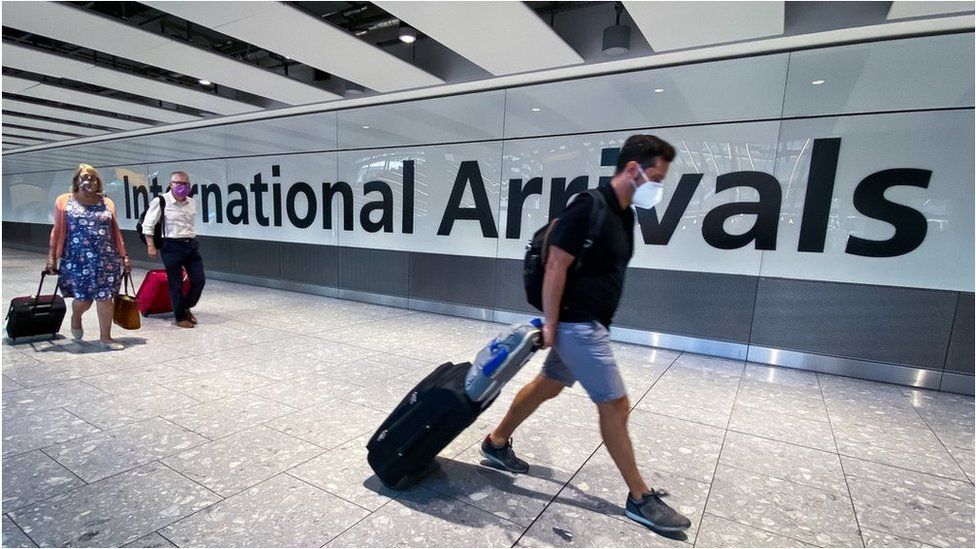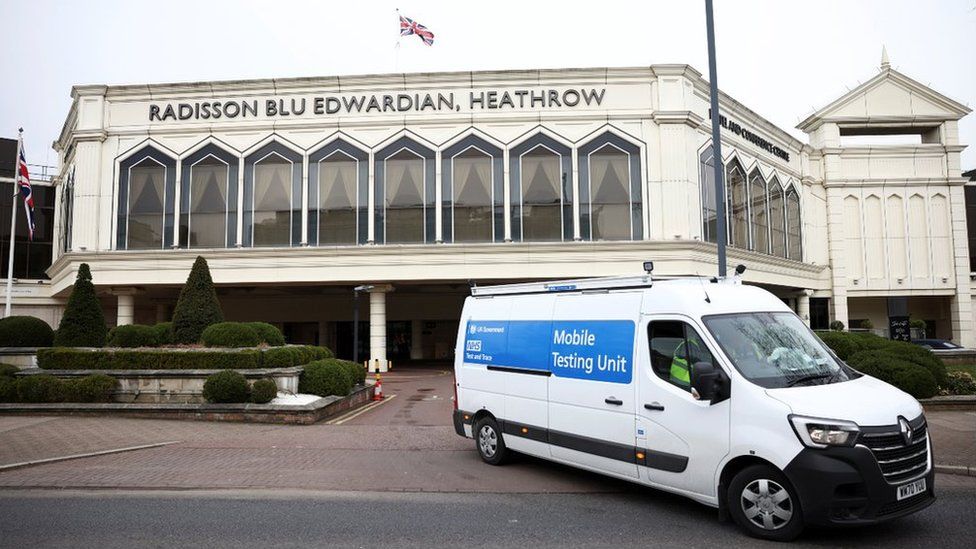Why is India being put on the travel ban list two weeks after Pakistan and Bangladesh?

image copyrightPA Media
India will be added to the government’s travel-ban red list from Friday 23 April.
It came after Boris Johnson cancelled his planned trip to the country because of the Covid situation there.
India has been reporting more than 200,000 cases daily since 15 April.
But Pakistan and Bangladesh have both been on the red list since 9 April.
The red list is the government’s list of 40 countries from which there are strict restrictions on travel to England.
Northern Ireland has similar rules in place, while Scotland’s are stricter and Wales does not currently have international flights arriving.
The rules are designed to protect the UK from new variants of Covid, against which existing vaccines may be less effective.
Travel to England is banned for anyone who has been in one of the countries in the past 10 days, except for UK citizens and residents, who have to isolate on arrival at government-approved hotels for 10 days.
The decision is based on Joint Biosecurity Centre risk assessments, which include:
- how good a country’s testing structures are, including checking for variants of concern
- how many cases those systems have identified
- whether people in that country have been catching new variants at home or the cases have come from overseas
- evidence of whether that country has exported cases of new variants to other countries, including to the UK
- how good the country’s travel links with the UK are
The first point on the list is important, because the genome sequencing needed to identify new variants is very sophisticated and relatively rare.
But just because a country has found new variants, or has many cases of coronavirus, it will not necessarily be on the red list.
On 13 April, the World Health Organization identified:
- 82 countries where the variant identified in South Africa had been found, of which only 21 were on the red list
- 52 countries with the variant identified in Brazil, of which 14 were on the red list
Bangladesh, which had the South Africa but not the Brazil variant, and Pakistan, which had neither, were added to the red list on 9 April.
But India, which had both as well as a new variant, was not added for another two weeks.
On 9 April:
- Pakistan had a seven-day average of 21 cases per million people
- Bangladesh had twice as many
- India had four times as many

In late March, India’s health authority said 771 variants of concern had been detected in a sample of almost 11,000 positive cases – a fraction of the millions of cases recorded in the country.
India has a greater sequencing ability than Pakistan or Bangladesh, although it is far behind the UK, which does about half of the world’s sequencing.
We asked the government why India wasn’t added before. Its response did not directly answer the question but said the red list was kept “under constant review”.
“Nobody knows the full criteria – but there may be a political element because the UK wants a trade deal with India,” Dr Simon Clarke, associate professor in cellular microbiology, at the University of Reading, said.
“It’s not always a data-driven decision,” he added, giving the example of Somalia, which is on the red list but has one of the lowest official rates of infection and deaths in the world.
Announcing the decision on India, Health Secretary Matt Hancock said the government had now found 103 cases of this new variant in the UK.
He said: “the vast majority have links to international travel and have been picked up by our testing at the border”.

image copyrightReuters
The samples are now being analysed to see whether this variant spreads quicker or whether it has resistance to vaccines.
The UK’s former chief scientific adviser Prof Mark Walport told the BBC that the new variant found in India was becoming the dominant variant and said: “what’s absolutely clear is that this variant is more transmissible in India”.
On adding India to the red list from Friday 23 April, he said: “These decisions are almost inevitably taken a bit too late in truth.”




